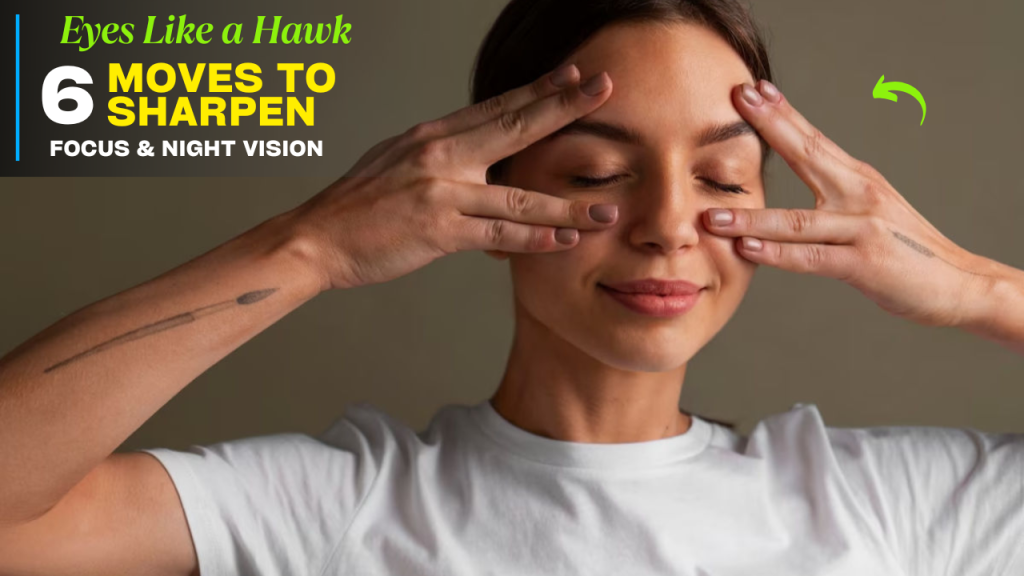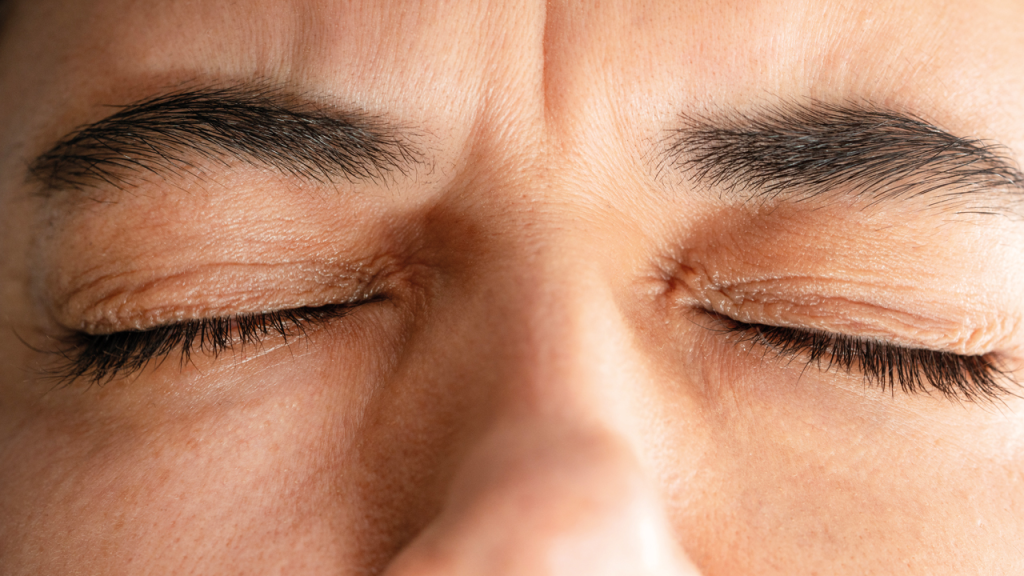Have you ever wondered how hawks spot prey from miles away or navigate dark skies with ease? While we may not have wings, the human eye has remarkable potential—if only we trained it. The modern lifestyle filled with screens, artificial lighting, and stress is slowly dulling our natural visual sharpness and night vision. But here’s the good news: with just a few daily habits, you can drastically improve your focus, and visual clarity, and even see better at night.
Let’s dive into the science-backed, eye-opening moves that can turn your vision from ordinary to extraordinary.

1. The 20-20-20 Rule — Give Your Eyes a Break, Literally

Do you stare at screens for hours without blinking? This everyday habit is quietly sabotaging your eye health.
The 20-20-20 rule is simple yet powerful: every 20 minutes, look at something 20 feet away for at least 20 seconds. This technique reduces digital eye strain, improves focus, and helps reset your eye muscles, which are constantly tensed during close-up work.
Interesting Fact: The human eye wasn’t designed for prolonged close-up tasks. Our ancestors used their vision mostly for distant hunting and scanning the horizon—not emails and texts.
2. Eye Yoga — Flex Those Focus Muscles

Just like your body, your eyes benefit from regular exercise. Eye yoga boosts ocular muscle strength, improves blood flow, and enhances overall focus.
Try this 2-minute routine daily:
- Look up and down slowly 10 times.
- Move your gaze left to right without moving your head.
- Roll your eyes in circles (clockwise, then counterclockwise).
- Focus on a nearby object, then shift to a distant one (repeat 5–10 times).
Do You Know? Regular eye exercises can delay age-related vision decline and even help reduce dependency on reading glasses over time.
3. Blink More, Blink Better

Most people blink up to 66% less when using screens. Reduced blinking dries out the eyes and can blur vision over time.
Make a conscious effort to blink fully and frequently. It helps to:
- Lubricate your eyes
- Improve focus
- Enhance night vision by maintaining a healthy tear film
Myth Busted: Some think frequent blinking is a sign of nervousness or lying—but in reality, it could be a sign your eyes are trying to cope with strain.
4. Night Vision Nutrients — Fuel Your Eyes

What you eat dramatically affects how well you see—especially in low-light conditions. These key nutrients support better night vision and sharp focus:
- Vitamin A – Essential for retinal function (found in carrots, liver, and leafy greens)
- Lutein & Zeaxanthin – Protect against light-induced damage (found in spinach, kale, and egg yolks)
- Zinc – Helps transport Vitamin A from the liver to the retina
- Omega-3 fatty acids – Reduce dry eyes and support eye cell integrity
Fun Fact: Carrots do support vision health—but they won’t give you superhero sight unless you’re deficient in Vitamin A.
5. Low Light Practice — Train for the Dark

To see better in the dark, you have to practice seeing in the dark. Just like your body adapts to exercise, your eyes can adapt to dim environments with regular exposure.
Try this technique:
- Spend 10–15 minutes in a dimly lit room each evening.
- Avoid using your phone or bright screens during this time.
- Let your eyes adjust and use ambient cues to navigate.
This helps your rods (the night vision cells in your retina) become more responsive.
Did You Know? It takes about 20–30 minutes for your eyes to fully adjust to the dark—but just a few seconds of bright light can reset the process.
6. Palming — Reset Your Vision Naturally

Borrowed from ancient yogic practices, palming relaxes the optic nerve and helps relieve visual fatigue.
How to do it:
- Rub your palms together to generate heat.
- Gently cup your palms over closed eyes (without pressing).
- Breathe deeply and stay like this for 1–2 minutes.
This technique reduces strain, enhances focus, and calms the nervous system—benefiting both your eyes and mind.
Bonus Tip: Practicing palming before bed can also improve sleep quality, which further supports healthy vision.
Final Thoughts: Train Your Vision Like a Muscle
While there’s no magic trick for instant “hawk eyes,” consistent daily care and mindful habits can significantly improve your focus, clarity, and night vision over time. Think of your eyes as an extension of your brain—they thrive on rest, nutrition, exercise, and attention.
Want sharper vision and laser-like focus? Start treating your eyes like the elite tool they are.
Frequently Asked Questions (FAQs)
Can you actually improve your night vision naturally?
Yes, night vision can improve with regular practice in low light, a nutrient-rich diet (especially Vitamin A, lutein, and zinc), and avoiding bright light before bed to allow proper dark adaptation.
How long does it take to see results from eye exercises?
Most people notice reduced eye strain and improved focus within 1–2 weeks of consistent daily practice. Long-term benefits like sharper vision can take a few months of regular training.
Is the 20-20-20 rule effective for everyone?
Yes, it’s a universally recommended technique by eye care professionals to combat digital eye strain, especially for people who spend extended time in front of screens.
Does blinking really affect vision clarity?
Absolutely. Blinking keeps your eyes moist and clears debris. Reduced blinking—especially during screen time—can cause dryness, blurred vision, and fatigue.
Are eye yoga exercises safe to do daily?
Yes, gentle eye exercises are safe for most people. However, if you have an eye condition like glaucoma or recent surgery, consult your eye doctor before starting.
What foods are best for improving focus and night vision?
Foods rich in Vitamin A (like carrots and liver), lutein and zeaxanthin (leafy greens), omega-3 fatty acids (fish and walnuts), and zinc (pumpkin seeds and red meat) are excellent for eye health.
How can I practice seeing better in the dark?
Spend 10–15 minutes daily in dim light without screens to let your eyes adapt. This strengthens your retina’s rod cells, which are responsible for night vision.
Is palming scientifically proven to work?
While not widely studied in clinical trials, palming is a widely accepted relaxation technique that may help relieve visual fatigue and reduce eye strain.
Can poor sleep affect my vision?
Yes, lack of quality sleep can lead to eye fatigue, blurred vision, twitching, and even dry eyes. Prioritizing sleep is essential for overall visual performance.
Do screen filters or blue light glasses improve focus?
They can help reduce eye strain from digital screens, especially in low light, but they should be combined with regular breaks and good screen habits for best results.





